- Home
- Terry C. Johnston
Sioux Dawn, The Fetterman Massacre, 1866 Page 5
Sioux Dawn, The Fetterman Massacre, 1866 Read online
Page 5
“That’s fair country up to the Tongue. Maybeso, even far up on Goose Crik. Better place for a fort.”
“Now what would an old trapper like you know about building a fort?” Brown scoffed, his eyes raking over his papers.
“Me? Nothing, I suppose, Cap’n. ’Cept, knowing Injuns the way I does. And building that fort of mine down to the Green River country, southwest of here. Picked that spot myself. Good enough for the army, I suppose.”
“What do you mean, it was good enough for the army?” Brown wet the end of his pencil on his tongue.
“Army brass figured my spot good enough for a fort that they bought mine.”
“I … see.” Brown fell back to counting.
Bridger was certain the captain knew nothing about those early days in the Rocky Mountains. How I had to fight off both marauding Indians and Mormon raiders when Brigham Young got it in his head that this big land weren’t big enough for both him and Jim Bridger to boot. No, this stupid captain wouldn’t know nothing about how the army kept coming back for my help year after year, campaign after campaign.
He studied the balding officer a moment more, then stared off as dawn’s touch of rose faded from the never-summer snows on the Big Horns hulking high above them. This ain’t that bad a spot. But why didn’t the colonel take me along? Did Carrington want to be shed of my advice? Damn, if army brass ain’t too oft like a cantankerous mule a’times. Never know which face they’d turn on a man with next.
Bridger had led the 2nd Battalion of the 18th Infantry north from Fort Laramie with all hope for a peace treaty left in tatters. The old scout himself had seen the guns and kegs of powder lashed on the wild Indian ponies as the Oglalla and Miniconjou turned their own noses north, returning to their hunting ground north of the Crazy Woman Fork.
Still, from time to time, he had to remind Carrington, “Them Bad Faces under Red Cloud ain’t about to welcome you with open arms, Colonel. Everything points to war.”
For the first few days out of Laramie, Bridger had wheedled and worked on the colonel, the old scout trying to convince him to use the longer but safer trail north. Back in 1864 Bridger had led emigrants to the Montana goldfields up the western slope of Big Horns. Through Shoshone land. “The Snakes aren’t out to lift white hair,” Bridger had lectured the officers.
“But John Bozeman evidently didn’t think much of your caution, Jim,” the colonel had said, smiling in that administrative way of his. “He blazed his own road north that makes an easier trip of it than does yours. Saving hundreds of miles. That’s why ex-soldiers from the war are scurrying along Bozeman’s road, despite all the talk of danger from the Sioux.”
“So where the almighty citizen wants to travel … that’s where the goddamned government will put its road. Duty bound to keep that road open with soldiers, I suppose.”
Carrington had grinned within his dark Vandyke beard. “Sounds as if you grasp the government mind, Mr. Bridger.”
“I been round enough army brass in my years to know stinkum when I smell it,” Jim had replied. “Come hell or war, them stiff-necked politicians back East get something in their heads, nothing’s bound to change it. Even good horse sense.”
Bridger had finally joined Carrington in laughing. If the army wanted to keep this Bozeman Road into Montana open, then by God, Jim Bridger would come along for the ride. Might prove damned interesting before the last dance of the ball was called.
“And you’re not a man to pass up something interesting, are you, Jim?”
They laughed harder, together. He didn’t know what it was, but Jim felt something appealing about the colonel. Bridger might even think he was growing to like Carrington. Still, he couldn’t shake that cold, gut-grip feeling that the colonel no more belonged out here commanding soldiers against angry Sioux than a whore belonged in Sunday service.
Atop his flea-bit gray mare of a mule, the old scout had led them across the North Platte and into the desolate moonscape that swallowed the Montana Road for better than a hundred fifty miles. North by northwest they plodded across the many parched creeks, every face caked with dust, throats parched with thirst. Times beyond counting when they did run across water, they found it so laced with alkali that the mules and horses even turned their noses from a taste.
Overhead a relentless summer sun continued to bake man and beast alike. Every evening’s camp brought new reports of more stock collapsed from the heat. Left for dead or the coyotes. Or the Sioux. Each dawn the new recruits marched on, prodded by the old veterans who placed a pebble in their mouths to stimulate saliva. Other old files even showed the youngsters how to carefully open a vein in their wrists. How to suck at their own hot, sticky blood. Quenching an unquenchable thirst that tormented a man almost as much as the visions swimming before their eyes.
With great relief they reached the valley of the Powder River, that flat ribbon of yellowed water crawling over beds of shifting sand and coarse gravel. It was here they stopped at the garrison of Fort Reno. A sterile, wind-scoured, hellish place. But Bridger cheered them all by telling the soldiers as they set about making repairs to wagons that they had passed the worst of it.
“Just look at you! The men. Your stock,” Capt. Joshua L. Proctor, Carrington’s new commander at Reno, had scolded the colonel in private, discussing the march beyond the Powder. “You can’t possibly go on, sir. The animals and men have had nearly all they can take.”
“We must push on,” the colonel had replied.
“For God’s sake, leave the women and children with us here. We’ll get them back to Laramie where they’ll be safe,” Proctor had begged.
“I’m afraid it’s too late to send them back now,” Carrington had confessed.
Is it too late to send Margaret and the boys back with the rest? the colonel wondered. Lord knows I’ve asked her time and again if she thought it best to return to Laramie, back to Fort Kearney where they’ll be safe and comfortable. Time and again she had refused his offer. She had married a soldier, she told him. So a soldier’s life she would share with him. That put an end to it every time.
Yet the colonel still wondered now as he argued with Proctor. Would the time ever come that I’ll regret my decision to march on with the women and children of this regiment in tow? Would the time ever come that I’ll regret not standing strong in sending them back? At Reno his resolve quivered, like a muscle flexed and worked, beaten and abused too many times.
Carrington had simply stared at Proctor with those dark, brooding eyes of his. As if pleading for someone to understand the compulsion pulling him north. “We must go on. All of us.”
For ten days he had allowed the command to tarry at Reno. Not because Carrington had wanted to—but because he had to. Making repairs to the ambulance and freight-wagon tires that split in the dry, searing heat. Repeatedly scanning the hills to the north for some sign of Lt. John Adair and his men chasing the Sioux who had roared down on Reno their very first day in camp and driven off some horses, mules and beef. Day after day they waited by the Powder, gathering strength sapped in the long march, fortifying themselves for what lay ahead. Carrington worried that Adair’s men had become his first casualties until the lieutenant’s detachment limped back in. Adair had located some of the stock after a long and costly chase. But no sign of feather nor bow.
Not a trace of the warriors who had welcomed Carrington’s men to the ancient hunting ground of the Sioux.
“But they’re out there,” Bridger had chided the young soldiers, all strut and cocky for a fight with the young, naked warriors. “You best understand they’re watching you boys every step of the way. When you don’t see a Injun in this part of the country, then it’s high time you start worrying. Like smoke in the wind. Them red niggers gone afore you see ’em. Soon enough, howsomever, you’ll see more of them bastards than you’d ever care to lay eyes on.”
With repairs made, Bridger had led Carrington’s soldiers away from Fort Reno. Almost from the moment they climbed out of the va
lley of the Powder, the Montana Road took the caravan into another country altogether. With each day the breeze blew sweeter. Cooler. The men stepped livelier as the column wound its way into the shadow of the Big Horns at last. Row upon row of forested ridges fanned like velvet-draped fingers into grass-covered hills stretching all the way to the foot of the mountains. A hundred-fifty-mile spine of mountains, erupting roughly northwest to southeast into this land of the Sioux.
With cloud-draped peaks on their left, the command made the dusty crossing of the Crazy Woman Fork. With Red Cloud’s warning still ringing in his ears, Carrington sent his skirmishers farther out along the high ridges. Twenty-three more miles brought his soldiers to the crossing of Clear Creek, a swift, cold, and noisy flow which would eventually find the Powder on its northward race. Rock Creek came next as the land grew lusher still. Taller timber. Richer grass. But barely a mile past the crossing, Henry Williams had come riding back to the head of the column to present Bridger and Carrington with two small boards torn from a cracker box he had found along the trail. A message scrawled on the wood told of a civilian caravan attacked here just the week before. Sioux had driven off most of the oxen and some of the horses. The message said the civilians had pressed on.
Carrington’s soldiers followed. Within a handful of miles the clear, blue waters of Lake DeSmet beckoned on their right. Named after a Jesuit priest who had traversed the West some thirty years before, the lake welcomed the weary marchers by offering thousands of ducks and geese.
“An amazing country,” Carrington had gushed as they skirted the lake.
“I think you’re getting the idea now, Colonel. Beginning to figure out why the Sioux wanna hold onto this country.” His arm swept in a wide arc. “Why they’ll fight you for every mile of it. Warning what they’d do if you crossed the Crazy Woman.”
Carrington nodded. “A soldier for every mile.”
That afternoon they had dropped into the valley created by the two Piney forks of the Clear Fork of the Powder River. Here, halfway along the spine of the Big Horns, a headland juts toward the eastern plains, like a mighty thumb pointing the way. The Peno Head thrusts down amid granite cliffs and thick forests before it spends itself along the Montana Road in what Bridger said was known as Lodge Trail Ridge.
“Beyond that ridge, you’ll find all the Sioux you’d ever want,” Bridger explained to Carrington and his staff as they looked across the valley of the Piney forks. “Camped down the Tongue. Up the Rosebud. Over on the Little Big Horn. Land fat with Sioux.”
Lodge Trail Ridge slanted gently south into a high valley cut ages ago by Big Piney and Little Piney creeks. Carrington found the southern end of the valley protected by more of the great mountain range itself, while to the east rose another spur the colonel would call Pilot Hill. Through the narrow opening between his Pilot Hill and Lodge Trail Ridge rushed the clear, cold waters of the combined Piney creeks, tumbling for the Powder and the Yellowstone, on to the Missouri and the sea far, far from this Sioux land.
Bridger led Carrington up the Bozeman Road where it skirted the western fringe of Pilot Hill. Here the valley spread itself before the colonel, like a woman would open her arms to embrace a lover, welcoming him into her warmth, into the fire of her most private, consuming passion.
Here lay a land blessed with wild tulip and larkspur. Hills dappled with the delicate white blossoms of wild pea. Down in the shaded draws grew a profusion of wild raspberry, gooseberry and red currant. Between the two bubbling Pineys rose a low range of hills separating the creeks. At the western end of those hills lay a large pine island thick with great stands of timber. Carrington breathed deep, drawing at the cool air rushing into the valley from the glaciers hung among the clouds above. Satisfied.
“Those will be the Sullivant Hills, Jim. Margaret’s maiden name, you see.”
The old scout finally nodded without comment, watching Carrington’s eyes search the approaching columns rumbling up behind them. Knowing the colonel looked for his wife. Yearning to have her approval of this place he had chosen to build his life’s dream.
A mile above where the road crossed the Little Piney rose a plateau that stood near the entrance to the valley itself. Anxiously Carrington had loped to the top, where he could gaze down on the creeks and grass so tall in the bottoms that a horse might disappear in it. His eyes climbed from the ridges to the foothills, upward to the imperial peaks above it all.
With his heart racing, Carrington removed General Cooke’s orders from his tunic. His dark eyes danced over the words. ‘Establishing a new post on or near the Piney Fork of the Powder River.’ Carefully he re-folded the orders and replaced them against his breast.
“The Lord’s seen fit to bring us to this place, Jim. It’s here I’ll build my fort. Down along that timbered island is more than enough lumber for construction. The creek bottoms will yield the clay to chink building timbers. Where the Little Piney flows close to the base of the plateau, I’ll set the stockade’s water-gates. Across the lush bottomland grows the tall grass that’ll provide winter’s hay for our stock. Yes, indeed, Mr. Bridger. You’ve brought the Eighteenth to the promised land. As in the days of Aaron, out of the bondage of the desert you’ve delivered us.”
Bridger chewed on that a bit while he studied the colonel’s face. “I think you ought to look on north a ways. Open country that is——”
“But none so fine.”
“Best look it over before deciding.”
Carrington watched the crow’s-feet at the corners of Bridger’s eyes crinkle with concern. “Yes, Jim. I promise you that. I’ll look it over before I decide.”
Behind them arose the clatter of hoofs. Carrington turned in the saddle, waving the two captains to his side.
“Our camping spot for the night, Colonel?” Frederick Brown inquired.
“Yes, Captain.”
Tenedore Ten Eyck’s left eye roamed the valley quickly. His right lid drooped, a life-long malady cursing him with a half-sleepy look. “Begging the Colonel’s pardon … but, this looks like an ideal strategic location for your new post.”
Carrington glanced at Ten Eyck approvingly. “Perhaps, Captain. Mr. Bridger has some country farther north to show me. So we’ll wait to see what tomorrow brings.”
Brown turned on the old scout. “Surely Mr. Bridger could never find anything so fair as this, Colonel.”
Over Brown’s shoulder Carrington watched the column leaders break the lip of the plateau. “True.” He winked at the old scout as he answered, “I think even Mr. Bridger will agree that the Lord himself has brought us to this place. It is here destiny has called us.”
Chapter 4
With his site chosen, work to erect Carrington’s vision of a mountain fortress began in earnest the next morning.
Captain Ten Eyck and his pioneers first staked out the dimensions of the fort from plans drawn up the previous spring in Nebraska Territory. Atop the plateau the fort stockade itself would spread some four-hundred-feet square, its four walls enclosing company barracks, officers’ quarters, a chapel and hospital, stables and laundry, warehouses and administrative buildings, a sutler’s store and powder magazine, along with an impressive bandstand and parade. Next, Carrington’s men staked out the dimensions of the quartermaster’s yard which would enclose civilian teamsters’ quarters and stables, the hay and wood yards, along with shops for wheelwrights, coopers and blacksmiths, and including the teamsters’ mess. Measuring some two hundred by six hundred feet, the quartermaster’s yard would reach the Little Piney, to ensure an uninterrupted supply of water in the event of siege.
Carrington sighed. The plateau was perfect. His long-dreamed-of fort fit atop it splendidly. A dream come to fruition, bringing the hand of civilization to this wild and savage land.
Now he could order horse-drawn mowers hitched so teamsters could comb down what would become company streets. Meanwhile, other soldiers pitched their white tents in row upon row across the top of the plateau. Into the valley of th
e Big Piney, work details of troopers and civilians hauled the horse-powered sawmill that would begin slabbing the lumber Carrington’s timber crews felled at dawn the very first morning after arrival. All along Pine Island rang the crack of axe, the whir of sawmill and the whip of men’s voices at labor. Once they had finished platting the fort site itself, the mowers moved into the lush valley below, there to begin cutting the tall grass for the coming winter.
Carrington’s soldiers had come to stay.
“Colonel?”
Lt. John Adair shouldered his way through the crowd of onlookers who had gathered round to welcome Carrington back as the sun was easing itself down upon the sharp spires of the Big Horns.
Adair saluted his commander. “We have a white man in custody—I’ve arrested him for spying.”
“Spying? Good Lord!”
“Yes, sir. He approached our location furtively. I immediately suspected him of being a spy for the hostiles in the surrounding countryside.”
“Jim?” Carrington turned to Bridger. “You know anything about this?”
“Can’t say as I do, Colonel. First I heard about it. You, Jack?”
Stead shook his dark head.
“Let’s talk with your spy, Lieutenant.”
In a wall tent surrounded by four armed troopers, the colonel and his scouts were presented to a short, bearded and very frightened man. He leaped to his feet as the tent flaps were drawn back. The look in his eyes told of his fear the soldiers had come at last to execute him. Trembling, he grabbed Carrington’s hand, jabbering in a mixture of Pidgin English and some French.
“See, Colonel? Just as I told you. A spy. One of those Frenchmen who hire to the English in the Canadian provinces. Inciting the Indians against Americans. Well, we have this one red-handed now—so to speak.”
“Not so fast, Lieutenant.” Carrington waved Adair back. “Jim, you understand French?”

 Black Sun, The Battle of Summit Springs, 1869
Black Sun, The Battle of Summit Springs, 1869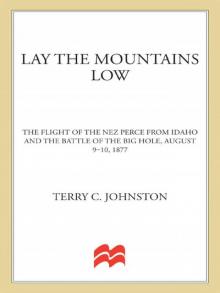 Lay the Mountains Low
Lay the Mountains Low Black Sun: The Battle of Summit Springs, 1869 (The Plainsmen Series)
Black Sun: The Battle of Summit Springs, 1869 (The Plainsmen Series)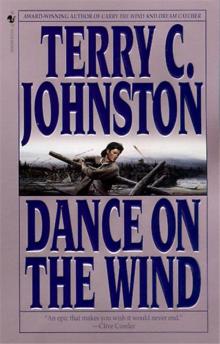 Dance on the Wind tb-1
Dance on the Wind tb-1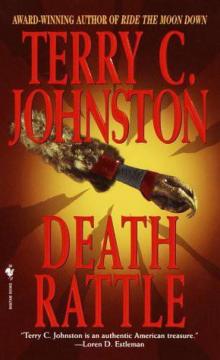 Death Rattle tb-8
Death Rattle tb-8 The Stalkers
The Stalkers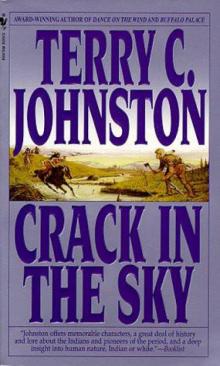 Crack in the Sky tb-3
Crack in the Sky tb-3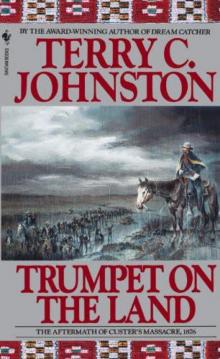 Trumpet on the Land: The Aftermath of Custer's Massacre, 1876 tp-10
Trumpet on the Land: The Aftermath of Custer's Massacre, 1876 tp-10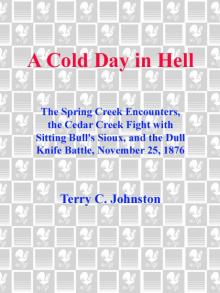 A Cold Day in Hell
A Cold Day in Hell Long Winter Gone: Son of the Plains - Volume 1
Long Winter Gone: Son of the Plains - Volume 1 Buffalo Palace
Buffalo Palace Cries from the Earth
Cries from the Earth Death Rattle
Death Rattle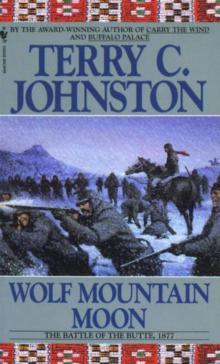 Wolf Mountain Moon: The Battle of the Butte, 1877 tp-12
Wolf Mountain Moon: The Battle of the Butte, 1877 tp-12 Crack in the Sky
Crack in the Sky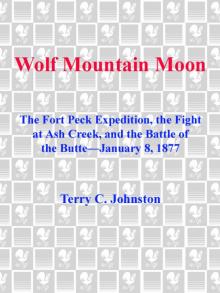 Wolf Mountain Moon
Wolf Mountain Moon Turn the Stars Upside Down: The Last Days and Tragic Death of Crazy Horse
Turn the Stars Upside Down: The Last Days and Tragic Death of Crazy Horse Winter Rain
Winter Rain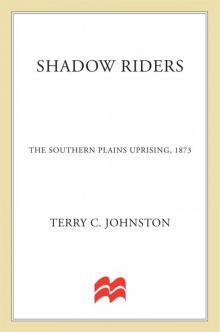 Shadow Riders: The Southern Plains Uprising, 1873 (The Plainsmen Series)
Shadow Riders: The Southern Plains Uprising, 1873 (The Plainsmen Series)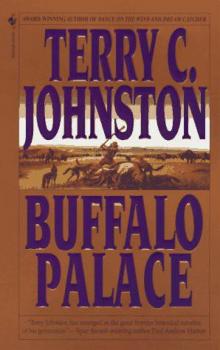 Buffalo Palace tb-2
Buffalo Palace tb-2 Cries from the Earth: The Outbreak Of the Nez Perce War and the Battle of White Bird Canyon June 17, 1877 (The Plainsmen Series)
Cries from the Earth: The Outbreak Of the Nez Perce War and the Battle of White Bird Canyon June 17, 1877 (The Plainsmen Series)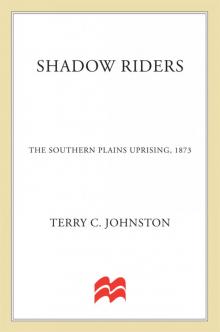 Shadow Riders, The Southern Plains Uprising, 1873
Shadow Riders, The Southern Plains Uprising, 1873 Ashes of Heaven (The Plainsmen Series)
Ashes of Heaven (The Plainsmen Series) Ashes of Heaven
Ashes of Heaven Devil's Backbone: The Modoc War, 1872-3
Devil's Backbone: The Modoc War, 1872-3 Wind Walker tb-9
Wind Walker tb-9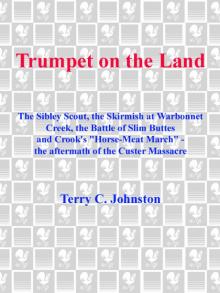 Trumpet on the Land
Trumpet on the Land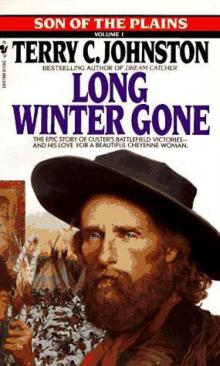 Long Winter Gone sotp-1
Long Winter Gone sotp-1 Dying Thunder
Dying Thunder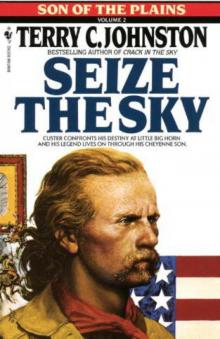 Seize the Sky sotp-2
Seize the Sky sotp-2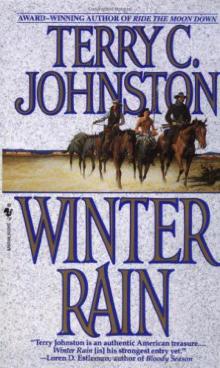 Winter Rain jh-2
Winter Rain jh-2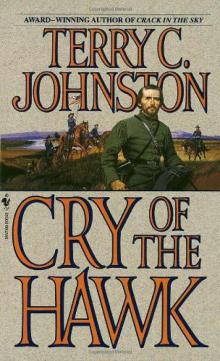 Cry of the Hawk jh-1
Cry of the Hawk jh-1 Sioux Dawn, The Fetterman Massacre, 1866
Sioux Dawn, The Fetterman Massacre, 1866 Sioux Dawn: The Fetterman Massacre, 1866 (The Plainsmen Series)
Sioux Dawn: The Fetterman Massacre, 1866 (The Plainsmen Series) Ride the Moon Down
Ride the Moon Down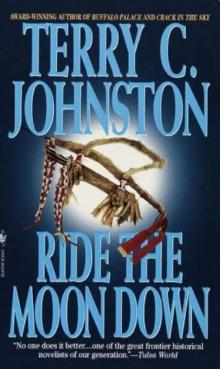 Ride the Moon Down tb-7
Ride the Moon Down tb-7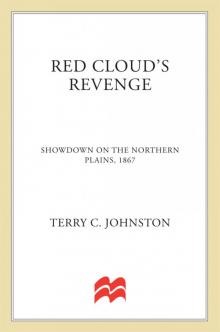 Red Cloud's Revenge
Red Cloud's Revenge Wind Walker
Wind Walker